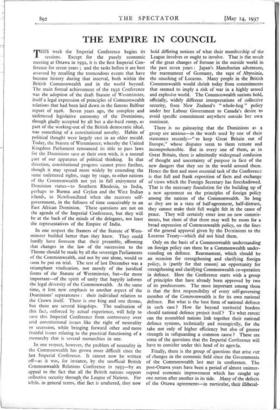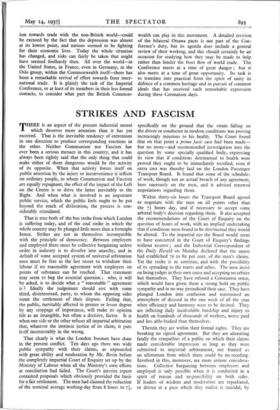THE EMPIRE IN COUNCIL
THIS week the Imperial Conference begins its sessions. Except for the purely economic meeting at Ottawa in 1932, it is the first Imperial Con- ference for seven years ; and the tasks before it are best assessed by recalling the tremendous events that have become history during that interval, both within the British Commonwealth and in the world beyond. The main formal achievement of the 193o Conference was the adoption of the draft Statute of Westminster, itself a legal expression of principles of Commonwealth relations that had been laid down in the famous Balfour report of 1926. Seven years ago, the complete and unfettered legislative autonomy of the Dominions, though gladly accepted by all but a die-hard rump, as part of the working-out of the British democratic ideal, was something of a constitutional novelty. Habits of political thought were largely cast in an older mould. Today, the Statute of Westminster, whereby the United Kingdom Parliament renounced its title to pass laws for the Dominions save at their own wish, is a normal part of our apparatus of political thinking. In that direction, constitutional progress cannot press further, though it may spread more widely by extending the same unfettered rights, stage by stage, to other nations of the Commonwealth not yet in full enjoyment of Dominion status—to Southern Rhodesia, to India, perhaps to Burma and Ceylon and the West Indian islands, to Newfoundland when she recovers self- government, in the fullness of time conceivably to an East African Dominion. These questions are not on the agenda of the Imperial Conference, but they will be at the back of the minds of the delegates, not least the representatives of the Empire of India.
In one respect the framers of the Statute of West- minster builded better than they knew. They could hardly have foreseen that their preamble, affirming that changes in the law of the succession to the Throne should be made by all the sovereign Parliaments of the Commonwealth, and not by one alone, would so soon be put on trial. The test of last December was a triumphant vindication, not merely of the juridical forms of the Statute of Westminster, but—far more important—of the spirit of unity that happily informs the legal diversity of the Commonwealth. At the same time, it lent new emphasis to another aspect of the Dominions' separateness : their individual relation to the Crown itself. There is one king and one throne, but there are several kingships. The realisation of this fact, enforced by actual experience, will help to save this Imperial Conference from controversy over arid constitutional issues like the right of neutrality or secession, while bringing forward other and more fruitful issues relating to the practical functioning of a monarchy that is several monarchies in one.
In one respect, however, the problem of neutrality in the Commonwealth has grown more difficult since the last Imperial Conference. It cannot now be written off—as it was, for instance, by the unofficial British Commonwealth Relations Conference in 1933—by an appeal to the fact that all the British nations support collective security through the League of Nations. For while, in general terms, that fact is unaltered, they now hold differing notions of what their membership of the League involves or ought to involve. That is the result of the great changes of fortune in the outside world in the past seven years : Japan's Manchurian adventure, the rearmament of Germany, the rape of Abyssinia, the smashing of Locarno. Many people in the British Commonwealth would shrink today from commitments that seemed to imply a risk of war in a highly armed and explosive world. The Commonwealth nations hold, officially, widely different interpretations of collective security, from New Zealand's " whole-hog " policy under her Labour Government to Canada's desire to avoid specific commitment anywhere outside her own continent.
There is no gainsaying that the Dominions as a group are anxious—in the words used by one of their statesmen recently—" to keep Great Britain out of Europe," whose disputes seem to them remote and incomprehensible. But in every one of them, as in Great Britain, there is admittedly widespread confusion of thought and uncertainty of purpose in face of the new dangers that they see in the world around them. Hence the first and most essential task of the Conference is that full and frank exposition of facts and exchange of views which the Foreign Secretary has foreshadowed. That is the necessary foundation for the building up of a new agreement on the principles of foreign policy among the nations of the Commonwealth. So long as they are in a state of half-agreement, half-distrust, they cannot make their full weight felt in the cause of peace. They will certainly enter into no new commit- ments, but short of that there may well be room for a broad expression of Commonwealth policy, on the lines of the general approval given by the Dominions to the Locarno Treaty—which did not bind them.
Only on the basis of a Commonwealth understanding on foreign policy can there be a Commonwealth under- standing on defence. Rearmament, which should be an occasion for strengthening and clarifying foreign policy, is (partly for that reason) an opportunity for strengthening and clarifying Commonwealth co-operation in defence. Here the Conference starts with a group of principles that have already been approved by two of its predecessors. The most important among them is that the first responsibility of every self-governing member of the Commonwealth is for its own national defence. But what is the best form of national defence in each case ? How far beyond territorial borders should national defence project itself ? To what extent can the assembled nations link together their national defence systems, technically and strategically, for the sake not only of higher efficiency but also of greater strength in safeguarding a common cause ? These are some of the questions that the Imperial Conference will have to consider under this head of its agenda.
Finally, there is the group of questions that arise out of changes in the economic field since the Governments of the Commonwealth last met in conference. The post-Ottawa years have been a period of almost uninter- rupted economic improvement which has caught up one nation after another in its tide. Many of the defects of the Ottawa agreements—in particular, their illiberal- ism towards trade with the non-British world—could be excused by the fact that the depression was almost at its lowest point, and nations seemed to be fighting for their economic lives. Today the whole situation has changed, and risks can fairly be taken that might have seemed foolhardy then. All over the world—in the United States, in France, even in Germany, in the Oslo group, within the Commonwealth itself—there has been a remarkable revival of effort towards freer inter- national trade. It is plainly the task of the Imperial Conference, or at least of its members in their less formal contacts, to consider what part the British Common- wealth can play in this movement. A detailed revision of the bilateral Ottawa pacts is not part of the Con- ference's duty, but its agenda does include a general review of their working, and this should certainly be an occasion for studying how they may be made to help rather than hinder the freer flow of world trade. The Conference meets at a time of great danger ; but it also meets at a time of great opportunity. Its task is to translate into practical form the spirit of unity in defence of a common heritage and in pursuit of common ideals that has received such remarkable expression during these Coronation days.















































 Previous page
Previous page